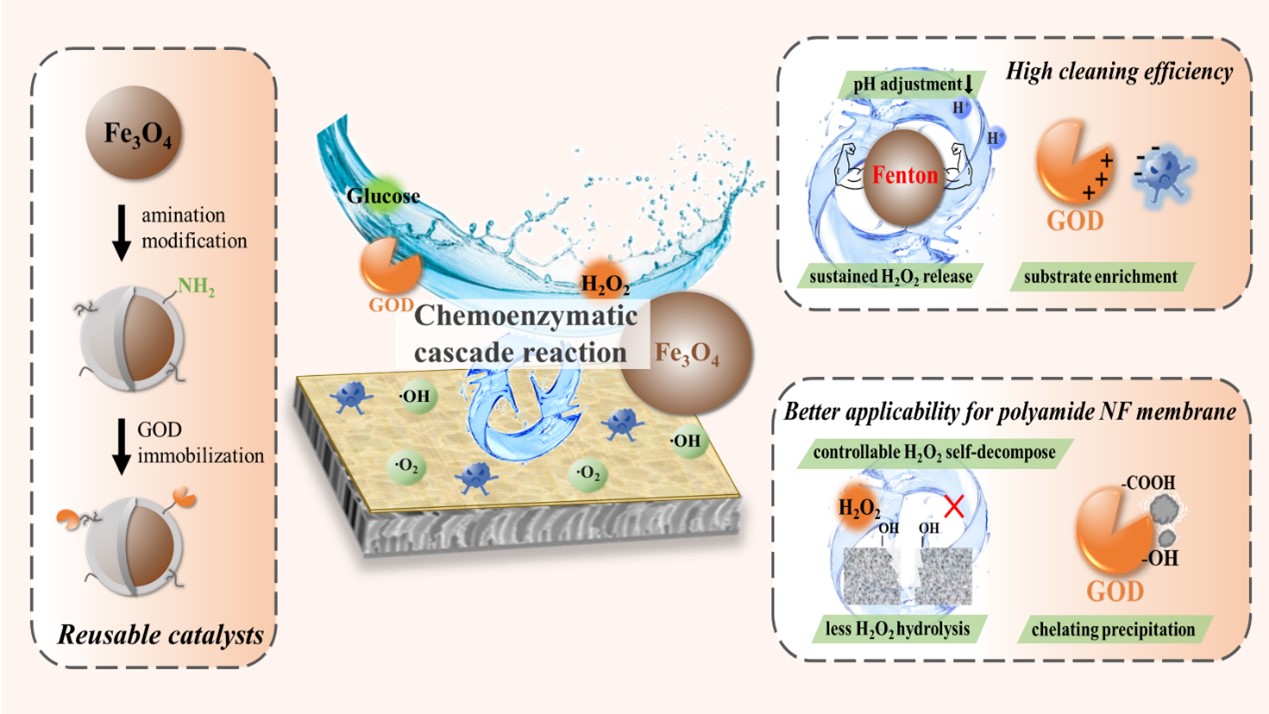A research group led by Prof. WAN Yinhua from the Institute of Process Engineering (IPE) of the Chinese Academy of Sciences has proposed a chemoenzymatic cascade reaction for green cleaning of polyamide nanofiltration membranes.
The study was published in ACS Applied Materials & Interfaces on Mar. 2 (DOI: 10.1021/acsami.1c23466).
Chemical cleaning is indispensable for the sustainable operation of nanofiltration (NF) in wastewater treatment and product purification. However, common chemical cleaning methods are plagued by low cleaning efficiency, high chemical consumption, and deteriorating membrane separation performance.
The Fenton reaction is a promising approach for highly effective membrane cleaning due to its remarkable oxidation capability. Unfortunately, a Fenton cleaning strategy requires a high concentration of hydrogen peroxide (H2O2) and an acidic environment, resulting in damage to the polyamide separation layer as well as heavy acid reagent consumption. Meanwhile, the transportation and storage of H2O2 are costly and very risky.
"In our proposed cascade reaction, a glucose oxidase (GOD) enzymatic reaction produces H2O2 and gluconic acid to trigger the oxidation of foulants by a Fe3O4-catalyzed Fenton reaction," said Prof. WAN.
The researchers found that this chemoenzymatic cascade reaction (GOD-Fe3O4) exhibited more favorable degradation efficiency than a single Fenton reaction, by benefiting from microenvironmental (i.e., pH and H2O2 concentration) engineering and substrate enrichment.
Thanks to strong oxidative degradation, the water flux of the NF10 membrane fouled by methyl blue was almost completely restored (~95.8%) after three cycles of fouling/cleaning experiments.
On the one hand, in-situ production and instant consumption of H2O2 in the cascade reaction prevented membranes from being damaged by a high concentration of H2O2. On the other hand, GOD biomolecules in the cascade system inhibited secondary fouling by ferric hydroxide precipitates. Thus, the polyamide NF membrane exhibited strong tolerance to the chemoenzymatic cascade reaction.
Moreover, the researchers prepared a reusable cleaning agent by immobilizing GOD on the aminated Fe3O4 nanoparticles to improve the sustainability of this cleaning strategy. The prepared catalysts (GOD-Fe3O4) exhibited stable degradation efficiency and a favorable cleaning effect with repeated use under an external magnetic field.
"This chemoenzymatic cascade reaction without addition of acid/base/oxidant provides a promising candidate for sustainable and cost-effective cleaning for polyamide NF membranes," said IPE Prof. LUO Jianquan, corresponding author of the study. "It also offers a feasible approach for optimizing the Fenton cleaning strategy."

Preparation of reusable catalysts and schematics of the chemoenzymatic cascade reaction for cleaning polyamide NF membranes. (Image by ZHANG Jinxuan)
Media Contact:
LI Xiangyu
Public Information Officer
Institute of Process Engineering, Chinese Academy of Sciences, Beijing 100190, P. R. China.
E-mail: xiangyuli@ipe.ac.cn
Tel: 86-10-82544826
 Search
Search




 京公网安备110402500047号
京公网安备110402500047号